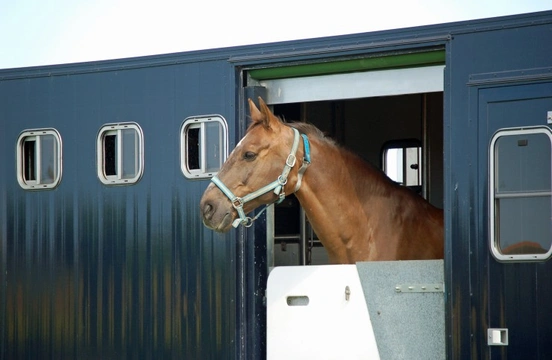
Emergency Horse travel essentials
Travelling and competing horses is a complicated business and it is not unknown for injury to occur, either whilst travelling or during an event, so it is well worth keeping a small veterinary first aid kit in your lorry or trailer for just those occasions. Large affiliated events and county shows will have vets present but smaller events will not so horse owners do need to be self sufficient on these occasions.
A good emergency travel First Aid kit could include the following items:-
- Two or three rolls of vet wrap which is sticky, self-adhesive bandage
- Individually wrapped sterile dressings of different sizes, the ones with a non-adhesive centre and sticky edges are the best
- A sharp pair of scissors
- A roll of gauze dressing which can be used to provide additional padding for dressings or cut into sections and used to clean a wound
- A small bowl to put water in
- Hibiscrub or some other anti bacterial wound cleaner
- A powerful small torch, useful if an incident occurs when you are driving home in the dark or if the light is poor when you are trying to attend to the horse
The main purpose of a travel kit is to provide a minimum amount of care and protection for a wound before it can be treated properly, either at home or in a veterinary hospital. Remember to replace the items in your travel kit if you use any and if you are fortunate enough not to have to use them, check them regularly to make sure they are all still within date and no damp or water has got in.
Injury to horses whilst travelling or competing is one thing but having an accident on the road whilst in transit or a vehicle breakdown is quite another. There are a number of items which can help to keep your passengers, both human and equine, safe in these conditions and such items are always worth carrying in your towing vehicle and lorry. These may include:-
- Yellow fluorescent jackets or tabards, these are invaluable if you are directing traffic away from your vehicle or just ensuring that you are visible to other drivers whilst you wait for recovery
- A red reflective warning triangle which can be placed in the road further back in the carriageway to alert other drivers of the hazard ahead
- Temporary lighting, ideally something hand held but which can also be placed on a stand on the ground or on top of a vehicle. Some breakdowns include complete power failure so you could lose your headlights and hazard lights
- Bungees of varying sizes, elastic cord with strong spring clips at either end, they are ideal for running repairs to doors and ramps in order to get the vehicle home
- A sharp Stanley knife
The accepted protocol is to leave the horse in the vehicle if it is happy to stand and wait; this is actually the safest place unless the vehicle the horse is in has become unsafe due to an accident or the horse needs to be removed due to injury. Horses that become agitated or distressed may have to be unloaded by the roadside and this will usually require a police road closure so the preference is always to leave the horse in situ if at all possible.
If you need to unload the horse, the police will close the road when the recovery transport arrives unless it is a minor country lane with little traffic. It is always best to pop a bridle on the horse in this situation just in case he becomes tricky to handle for any number of reasons.
Having recovery for your horse is an essential part of your motoring costs as recovery companies will not recover your vehicle with the horse still on board so separate arrangements will need to be made for the equine passengers. Recovery of vehicle and horse in this situation can cost anywhere in the region of £2,000 so it is far better to pay for this roadside assistance as part of your motor insurance than risk being caught out in the event of an accident. Some people rely on friends to bring them home but it is not always convenient or possible to implement this and that type of arrangement really doesn’t work if you are travelling longer distances.
Always remember to make sure your horse is happy and well rested before you travel home after a competition, that he is not too hot and has adequate hay and water. If you do then have a breakdown or experience a serious delay due to another traffic issue, the horse is far more likely to wait quietly for that additional time. Always ensure you have enough hay, water and feed for a journey that may end up being much longer than originally planned.



